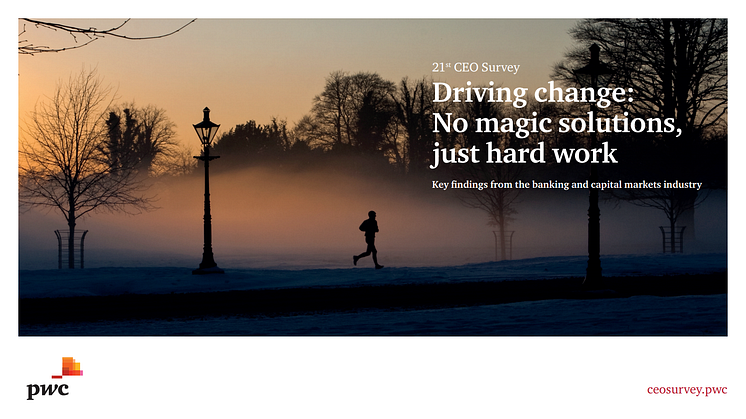
Press release -
Cyber threats topple over-regulation as top risk for Banking and Capital Markets CEOs
| Date | 23 March 2018 |
| Contact |
Natalie Choo, Singapore Communications Mobile: +65 8722 7545 E-mail: natalie.yl.choo@sg.pwc.com Joost Blankenspoor, Global Communications Tel: +31 88 792 6596 Email: joost.blankenspoor@pwc.com |
Banking & Capital Markets (BCM) CEOs are bullish about economic growth – 57% believe it will improve over the next 12 months, compared to 30% in 2017
BCM CEOs’ optimism about the economy hasn’t translated into increasing confidence in the prospects for their own organisations – 38% are very confident about their companies’ ability to boost revenue growth over the next 12 months, down from 40% in 2017
The pace of technological change (85%) and the closely-related impact of changing consumer behaviour (73%) as threats to growth are on the rise
It’s probably why less than half (44%) of BCM CEOs are clear about how robotics and AI can improve customer experience
Cyber threats have replaced over-regulation as top concern for Banking and Capital Markets (BCM) CEOs. 89% are worried about their cybersecurity, while 93% will be investing more heavily in it in 2018. That’s one of the main takeaways from the report ‘Driving change: no magic solutions, just hard work’, which is part of PwC’s 21th Global Survey and highlights the outcomes of interviews with 188 BCM CEOs around the world.
Tan Shong Ye, Digital Trust Leader, PwC Singapore says:
“Financial services is a key pillar of Singapore’s economy. Any cyber incidents will not only impact a single institution but have a ripple effect throughout the wider ecosystem.
“In keeping up with digital disruption, banks needs to be agile in adopting technologies such as cloud, artificial intelligence and blockchain to compete in the digital economy. This cyber agility must be accompanied with cyber resilience in order to maintain Singapore’s position as a regional and global financial centre.”
Paul O’Rourke, Asia Pacific Cyber Security Leader, PwC Singapore says:
“As there is an increasing inevitability for banking and capital markets organisations regarding cyber compromise, the focus must therefore move from a security and controls focus to managing cyber as an enterprise risk. This approach improves the prioritisation of security resources and capital, and enables the organisation to better address security prevention, detection, mitigation and response capabilities.”
Partnering rather than competing with FinTech
BCM CEOs seeing the pace of technological change (85%) and the closely-related impact of changing consumer behaviour (73%) as threats to growth is up on last year. They’re realising customer behaviour can’t be addressed without first dealing with the technological disruption that drives them. At the same time, the relatively low level of perceived disruption coming from new competition would suggest that the heat from FinTech is easing off. Rather than a potential rival, FinTech businesses are coming to be seen as a valued source of innovation and talent.Capitalising on the potential of new technologies is also as much about talent as tech itself. People rather than systems drive innovation and realise its full commercial potential. As the CEO Survey findings highlight, attracting digital talent is notoriously hard – less than 20% of BCM CEOs see it as easy. While much of the focus is on bringing in app developers, robotics engineers and other specialists, it’s just as important to ensure that tech awareness permeates throughout the organisation, including senior leadership.
People strategy for the digital age
It’s also key to consider how to organise talent when humans and machines are now coming to work so closely as part of a hybrid workforce. Most BCM CEOs are still trying to work out how to make the most of the collaborative potential – when thinking about their people strategy for the digital age, less than half (44%) are clear about how robotics and AI can improve customer experience, for example.
BCM organisations also need to address common anxieties about the impact of automation and AI. When asked whether they are creating transparency over the impacts of automation and AI to help build trust within their workforces, nearly two-thirds of BCM CEOs said yes and a further 10% plan to do so in the next 12 months. However, more than 20% aren’t addressing this issue and have no immediate plans to do so.
ENDS
Notes to editors:
188 Banking & Capital Markets CEOs were surveyed as part of PwC’s Global CEO Survey. For more information see: www.pwc.com/ceosurvey.
Related links
Topics
Categories
About PwC
At PwC, our purpose is to build trust in society and solve important problems. We’re a network of firms in 158 countries with more than 236,000 people who are committed to delivering quality in assurance, advisory and tax services. Find out more and tell us what matters to you by visiting us at www.pwc.com.
PwC refers to the PwC network and/or one or more of its member firms, each of which is a separate legal entity. Please see www.pwc.com/structure for further details.
© 2017 PwC. All rights reserved



